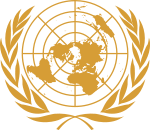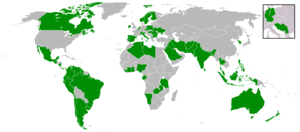- President of the United Nations General Assembly
-
President of the
United Nations General Assembly
Emblem of the United NationsAppointer United Nations General Assembly Term length 1 year Inaugural holder Paul-Henri Spaak Formation 1946 Website List of Presidents of the UN General Assembly The President of the United Nations General Assembly is a position voted for by representatives in the United Nations General Assembly (UNGA) on a yearly basis.
Contents
Election
The session of the assembly is scheduled for every year starting in September - any special, or emergency special, assemblies over the next year will be headed by the president of UNGA.
The presidency rotates annually between the five geographic groups: African, Asian, Eastern European, Latin American and Caribbean, and Western European and other States.[1]
Because of their powerful stature globally, some of the largest, most powerful countries have never held the presidency, such as the People's Republic of China, France, Japan, Russia, the United Kingdom, and the United States. In particular, it is customary that a national of a permanent member of the United Nations Security Council never serves as General Assembly president.
The only country that had a national elected as President of the United Nations General Assembly twice is Argentina; all the other member states had been represented only once by their nationals holding this office.
Reform
Clear and appropriate criteria have been proposed prior to the consideration of candidacies and to establish of an "elections committee" or, alternatively, a search committee.[2] Criteria include:
- Availability to devote full-time attention for many months;
- Political independence;
- Multilateral leadership experience, including negotiation and consensus-building skills and the ability to deal with multiple powerful stakeholders; and
- A thorough understanding of the United Nations Charter.
Other propositions includes presidential voting by citizens of all over the world to elect the UNGA president.
List of presidents
Session Number Year Name of President[3] UN member state Region First 1946 Paul-Henri Spaak  Belgium
BelgiumWES First special 1947 Oswaldo Aranha  Brazil
BrazilLAS Second 1947 Oswaldo Aranha  Brazil
BrazilLAS Second special 1948 José Arce  Argentina
ArgentinaLAS Third 1948 Herbert Vere Evatt  Australia
AustraliaCOS Fourth 1949 Carlos P. Romulo  Philippines
PhilippinesEAS Fifth 1950 Nasrollah Entezam  Iran
IranEAS Sixth 1951 Luis Padilla Nervo  Mexico
MexicoLAS Seventh 1952 Lester B. Pearson  Canada
CanadaCOS Eighth (First Woman President) 1953 Vijaya Lakshmi Pandit  India
IndiaCOS Ninth 1954 Eelco N. van Kleffens  Netherlands
NetherlandsWES Tenth 1955 José Maza  Chile
ChileLAS First emergency special 1956 Rudecindo Ortega  Chile
ChileLAS Second emergency special 1956 Rudecindo Ortega  Chile
ChileLAS Eleventh 1956 Wan Waithayakon  Thailand
ThailandEAS Twelfth 1957 Leslie Munro  New Zealand
New ZealandCOS Third emergency special 1958 Leslie Munro  New Zealand
New ZealandCOS Thirteenth 1958 Charles Habib Malik  Lebanon
LebanonMES Fourteenth 1959 Víctor Andrés Belaúnde  Peru
PeruLAS Fourth emergency special 1960 Víctor Andrés Belaúnde  Peru
PeruLAS Fifteenth 1960 Frederick Henry Boland  Ireland
IrelandWES Third special 1961 Frederick Henry Boland  Ireland
IrelandWES Sixteenth 1961 Mongi Slim  Tunisia
TunisiaMES Seventeenth 1962 Muhammad Zafarullah Khan  Pakistan
PakistanCOS Fourth special 1963 Muhammad Zafarullah Khan  Pakistan
PakistanCOS Eighteenth 1963 Carlos Sosa Rodriguez  Venezuela
VenezuelaLAS Nineteenth 1964 Alex Quaison-Sackey  Ghana
GhanaCOS Twentieth 1965 Amintore Fanfani  Italy
ItalyWES Twenty-first 1966 Abdul Rahman Pazhwak  Afghanistan
AfghanistanAsia Fifth special 1967 Abdul Rahman Pazhwak  Afghanistan
AfghanistanAsia Fifth emergency special 1967 Abdul Rahman Pazhwak  Afghanistan
AfghanistanAsia Twenty-second 1967 Corneliu Mănescu  Romania
RomaniaEEG Twenty-third 1968 Emilio Arenales Catalan  Guatemala
GuatemalaGRULAC Twenty-fourth 1969 Angie Elisabeth Brooks  Liberia
LiberiaAfrica Twenty-fifth 1970 Edvard Hambro  Norway
NorwayWEOG Twenty-sixth 1971 Adam Malik  Indonesia
IndonesiaAsia Twenty-seventh 1972 Stanisław Trepczyński  Poland
PolandEEG Twenty-eighth 1973 Leopoldo Benites  Ecuador
EcuadorGRULAC Sixth special 1974 Leopoldo Benites  Ecuador
EcuadorGRULAC Twenty-ninth 1974 Abdelaziz Bouteflika  Algeria
AlgeriaAfrica Seventh special 1975 Abdelaziz Bouteflika  Algeria
AlgeriaAfrica Thirtieth 1975 Gaston Thorn  Luxembourg
LuxembourgWEOG Thirty-first 1976 Hamilton Shirley Amerasinghe  Sri Lanka
Sri LankaAsia Thirty-second 1977 Lazar Mojsov  SFR Yugoslavia
SFR YugoslaviaEEG Eighth special 1978 Lazar Mojsov  SFR Yugoslavia
SFR YugoslaviaEEG Ninth special 1978 Lazar Mojsov  SFR Yugoslavia
SFR YugoslaviaEEG Tenth special 1978 Lazar Mojsov  SFR Yugoslavia
SFR YugoslaviaEEG Thirty-third 1978 Indalecio Liévano  Colombia
ColombiaGRULAC Thirty-fourth 1979 Salim A. Salim  Tanzania
TanzaniaAfrica Sixth emergency special 1980 Salim A. Salim  Tanzania
TanzaniaAfrica Seventh emergency special 1980 Salim A. Salim  Tanzania
TanzaniaAfrica Eleventh special 1980 Salim A. Salim  Tanzania
TanzaniaAfrica Thirty-fifth 1980 Rüdiger von Wechmar  Federal Republic of Germany (West Germany)
Federal Republic of Germany (West Germany)WEOG Eighth emergency special 1981 Rüdiger von Wechmar  Federal Republic of Germany (West Germany)
Federal Republic of Germany (West Germany)WEOG Thirty-sixth 1981 Ismat T. Kittani  Iraq
IraqAsia Seventh emergency special - Continuation 1982 Ismat T. Kittani  Iraq
IraqAsia Ninth emergency special 1982 Ismat T. Kittani  Iraq
IraqAsia Twelfth special 1982 Ismat T. Kittani  Iraq
IraqAsia Thirty-seventh 1982 Imre Hollai  Hungary
HungaryEEG Thirty-eighth 1983 Jorge E. Illueca  Panama
PanamaGRULAC Thirty-ninth 1984 Paul J. F. Lusaka  Zambia
ZambiaAfrica Fortieth 1985 Jaime de Piniés  Spain
SpainWEOG Thirteenth special 1986 Jaime de Piniés  Spain
SpainWEOG Forty-first 1986 Humayun Rashid Choudhury  Bangladesh
BangladeshAsia Fourteenth special 1986 Humayun Rashid Choudhury  Bangladesh
BangladeshAsia Forty-second 1987 Peter Florin  German Democratic Republic (East Germany)
German Democratic Republic (East Germany)EEG Fifteenth special 1988 Peter Florin  German Democratic Republic (East Germany)
German Democratic Republic (East Germany)EEG Forty-third 1988 Dante Maria Caputo  Argentina
ArgentinaGRULAC Forty-fourth 1989 Joseph Nanven Garba  Nigeria
NigeriaAfrica Sixteenth special 1989 Joseph Nanven Garba  Nigeria
NigeriaAfrica Seventeenth special 1990 Joseph Nanven Garba  Nigeria
NigeriaAfrica Eighteenth special 1990 Joseph Nanven Garba  Nigeria
NigeriaAfrica Forty-fifth 1990 Guido de Marco  Malta
MaltaWEOG Forty-sixth 1991 Samir S. Shihabi  Saudi Arabia
Saudi ArabiaAsia Forty-seventh 1992 Stoyan Ganev  Bulgaria
BulgariaEEG Forty-eighth 1993 Samuel Insanally  Guyana
GuyanaGRULAC Forty-ninth 1994 Amara Essy  Côte d'Ivoire
Côte d'IvoireAfrica Fiftieth 1995 Diogo Freitas do Amaral  Portugal
PortugalWEOG Fifty-first 1996 Razali Ismail  Malaysia
MalaysiaAsia Tenth emergency special 1997 Razali Ismail  Malaysia
MalaysiaAsia Nineteenth special 1997 Razali Ismail  Malaysia
MalaysiaAsia Fifty-second 1997 Hennadiy Udovenko  Ukraine
UkraineEEG Tenth emergency special - Continuation 1998 Hennadiy Udovenko  Ukraine
UkraineEEG Twentieth special 1998 Hennadiy Udovenko  Ukraine
UkraineEEG Fifty-third 1998 Didier Opertti Badan  Uruguay
UruguayGRULAC Tenth emergency special - Continuation 1999 Didier Opertti Badan  Uruguay
UruguayGRULAC Twenty-first special 1999 Didier Opertti Badan  Uruguay
UruguayGRULAC Fifty-fourth 1999 Theo-Ben Gurirab  Namibia
NamibiaAfrica Twenty-second special 1999 Theo-Ben Gurirab  Namibia
NamibiaAfrica Twenty-third special 2000 Theo-Ben Gurirab  Namibia
NamibiaAfrica Twenty-fourth special 2000 Theo-Ben Gurirab  Namibia
NamibiaAfrica Fifty-fifth 2000 Harri Holkeri  Finland
FinlandWEOG Tenth emergency special - Continuation 2000 Harri Holkeri  Finland
FinlandWEOG Twenty-fifth special 2001 Harri Holkeri  Finland
FinlandWEOG Twenty-sixth special 2001 Harri Holkeri  Finland
FinlandWEOG Fifty-sixth 2001 Han Seung-soo  Republic of Korea (South Korea)
Republic of Korea (South Korea)Asia Fifty-seventh 2002 Jan Kavan  Czech Republic
Czech RepublicEEG Fifty-eighth 2003 Julian Hunte  Saint Lucia
Saint LuciaGRULAC Fifty-ninth 2004 Jean Ping  Gabon
GabonAfrica Sixtieth 2005 Jan Eliasson  Sweden
SwedenWEOG Sixty-first 2006 Haya Rashed Al-Khalifa  Bahrain
BahrainAsia Sixty-second 2007 Srgjan Asan Kerim  Macedonia
MacedoniaEEG Sixty-third 2008 Miguel d'Escoto Brockmann  Nicaragua
NicaraguaGRULAC Sixty-fourth 2009 Ali Abdussalam Treki  Libya
LibyaAfrica Sixty-fifth 2010 Joseph Deiss  Switzerland
SwitzerlandWEOG Sixty-sixth 2011 Nassir Al-Nasser[4]  Qatar
QatarAsia Abbreviations:
Pre-1966
- COS - Commonwealth Seat
- EAS - Eastern European and Asian Seat
- LAS - Latin American Seat
- MES - Middle Eastern Seat
- WES - Western European Seat
Since 1966
- Africa - African Group
- Asia - Asian Group
- EEG - Eastern European Group
- GRULAC - Latin American and Caribbean Group
- WEOG - Western European and Others Group
See also
- President of the United Nations Security Council
References
- ^ "UN: About the General Assembly". http://www.un.org/ga/55/bgrdga.htm. Retrieved 2009-09-16.
- ^ "Proposed elections committee". http://www.unelections.org/files/IGP_PGASelectionLetter_18Jan07.pdf. Retrieved 2009-09-16.
- ^ http://www.un.org/en/ga/president/index.shtml
- ^ United Nations document GA/11105
External links
- UN: List of UN General Assembly presidents
- UN General Assembly President Election Reform.
- UNelections.org.
- More news on UN elections and appointments.
President of the United Nations General Assembly 1940s 1950s 1960s 1970s 1980s 1990s 2000s 2010s Categories:- Presidents of the United Nations General Assembly
Wikimedia Foundation. 2010.


